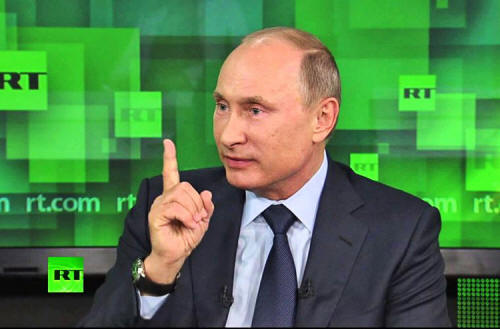|
from Collective-Evolution Website
EU parliament voted on a non-legislative
resolution which calls for it to "respond to information warfare by
Russia," a move that has named specific media companies as "tools"
for spreading this propaganda.
Essentially, Russia and IS are now perceived on the same level as international threats...
According to a press release from European Parliament:
What this essentially means is that the EU is formally unleashing its own counter-propaganda initiative.
Adding to these fears, a report written by Anna Fotyga, a Polish member of the European Conservatives and Reformists (ECR) group, suggests that Moscow provides financial support to opposition parties and organizations of member states, trying to weaken or cast doubt against the EU.
The report goes on to say that,
The counteractive resolution was favored 304 to 179, with 208 abstentions.
Shortly after, Russian President Vladimir Putin commented on the EU's decision, stating that while "everyone tries to lecture" Russia on democracy, European lawmakers themselves resort to a policy of restrictions,
He later went on to praise outlets like RT for their excellence in journalism.
Putin also commented on the report, saying it demonstrates "political degradation" in regard to the "idea of democracy" in the West.
What Is This About?
What is really going on here?
This report comes out shortly after stories emerged of 'fake news' running rampant on the Internet and 'clogging' social media platforms. It all seems to be well timed.
The much-debated topic has left mainstream media outlets backpedalling, looking for someone to point the finger at for Trump's election win, and it seems as though they've landed on independent media as their culprit.
This EU report also mentions some "social media and internet trolls" from Russia who are thought to "challenge democratic values."
German Chancellor Angela Merkel's statement earlier this week would certainly seem to support this theory:
She warned that public opinion was being "manipulated" on the internet.
As reported by France 24, she goes on to say,
I think more education on digital media literacy could be a good start.
Merkel said the challenge for democrats was to,
I can't help but wonder if she is alluding to censorship...
She said she supported initiatives by her right-left coalition government to crack down on "hate speech" on social media in the face of what she described as,
It sounds like, in other words, the establishment wants to retain its power and order and feels threatened by the changing political climate of the collective.
I reached out to RT for an official statement but have yet to hear back. I suspect this is a story we all, especially those in independent media, will be closely following, and I suggest you to as well.
Any form of censorship threatens our right to free speech and our ability to choose what news we want to read, listen to, and watch.
This all begs questions that need sound answers, like:
Sources
|


